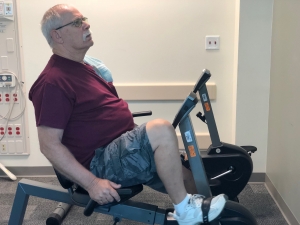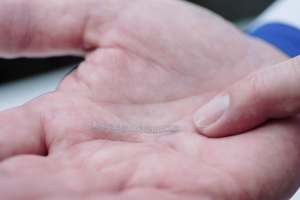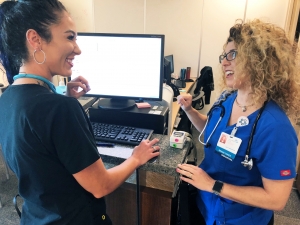Jerry McCarty has had open heart surgery, two heart attacks and five stents, but that doesn’t stop the 69-year-old from hopping on an exercise bike early one weekday morning.
In fact, his cardiac events are his motivation for exercising. So are his three sons, seven grandchildren and his wife of 50 years.
Recent studies by leading organizations such as Mayo Clinic and the American Heart Association show that cardiac rehabilitation lowers the risk of future cardiac events and helps patients eat better, lose weight, and better engage in daily activities.
Working out it in the environs of a Cardiac Rehabilitation program, overseen by a Cardiologist and monitored by an exercise specialist and a cardiac trained nurse, makes all the difference to Mr. McCarty.

“The treadmill makes me a little leery,” said Mr. McCarty, who finished the last of his 36 cardiac rehab sessions (generally covered by health insurance) in mid-June. When he’s not working out at LRH, he is a member of Planet Fitness. When his kids were young boys, he was very active, coaching baseball and basketball. His first cardiac event at age 42 was “kind of a surprise,” he said.
“I didn’t feel good. I thought it was just the flu. Turns out, I had a complete blockage. Next thing I knew, I was under the knife. I had no symptoms leading up to it.”
Following his open-heart surgery, his now retired cardiologist in Tampa explained that with his family history of cardiac disease, he’d likely need surgery again down the road. The surgeon was unfortunately correct that Mr. McCarty’s cardiac events were not over. Mr. McCarty had heart attacks in 2001 and 2006, the latter more concerning than the others.
“The last one I lost my breath and had to call an ambulance. It was very severe.”

He’s had several stents placed to open up his arteries and hopefully avoid any invasive surgery, the most recent in January by Lakeland Regional Health Interventional Cardiologist Sami Baddoura, MD. A stent is a tiny mesh tube coated with medicine placed when an artery is clogged to widen the artery.
Today, the retired 31-year Alcoa aluminum plant worker – “I did about every job in there” – and Vietnam War veteran takes it easy.
“I just take it in stride,” Mr. McCarty said.
At Lakeland Regional Health’s Cardiac Rehabilitation Program located at the North Complex/Hollis Cancer Center, there are four treadmills, two exercise bikes, two recumbent bikes, a weight room and a station for vital signs. Patients are hooked up to a monitor and given a regimen for their sessions. They can watch TV or listen to music while they exercise.

“We can tell really quickly if they’re not feeling well or if their blood sugar is low,” said Stephanie Thomas, RN, Cardiac Rehabilitation Nurse. “We watch their facial expressions, vertical breathing and make sure they can carry on a conversation with at least three words.”
The impact Cardiac Rehab can make is significant, said Ms. Thomas. “We perform a pre-rehab stress test and a post-rehab stress test, and the improvement is huge.”
So how do you know if you need cardiac rehabilitation like Mr. McCarty?
Cardiac rehabilitation can help those who have:
- Heart failure
- Heart attack
- Coronary angioplasty
- Coronary artery bypass grafting (CABG)
- Heart valve repair or replacement
- Heart transplant
- Angina (chest pain related to coronary blockages)
“We want to get cardiac patients back to doing all the activities they love to do,” said Dr. Baddoura. “That means getting your heart and body back in shape – and keeping exercise part of your lifestyle.”
Because coronary artery disease develops over decades, you might not notice a problem until you have a blockage or heart attack, as is the case with Mr. McCarty. Signs you may have coronary artery blockage:
- Chest pain (angina) or pressure or tightness in your chest.
- Shortness of breath.
- Heart attack.
To learn more about Lakeland Regional Health’s Cardiac Rehabilitation program, call 863.284.5020 or visit http://www.mylrh.org/cardiacrehab/.
